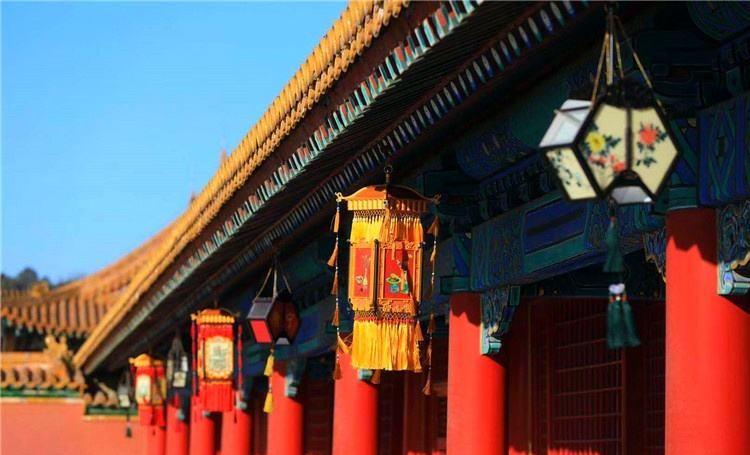The eldest New Year's Day, suddenly remembered a paragraph:
It was the middle of the hot day, and a peasant woman was doing a hard job, and suddenly sighed: "The empress dowager really doesn't know how happy she is." At this time, I was not taking a nap in bed, but when I woke up, I shouted: Eunuch, take a persimmon cake! ’”
This is a fragment of Mr. Lu Xun's essay "Human Words". Life in the palace, of course, will not be as simple and unpretentious as the farmer imagined. What does that look like?
Today, let's talk about the food problem of the Qing Dynasty Imperial Palace during the New Year.

The Qing Dynasty Imperial Palace had two large meals during the New Year.
The first is the Chinese New Year's Eve meal of the Chinese New Year's Eve. That evening, the Emperor held a grand Chinese New Year's Eve dinner at the Bohol Palace, inviting the Empress, concubines, and the rest of the royal family to dine with them. Although the emperor had many concubines, they all opened up in their own small kitchens on weekdays and did not eat with the emperor. Only when they reached the Chinese New Year's Eve could they accompany the emperor at the Chinese New Year's Eve meal.
In the hit network drama "Yanxi Raiders", Wei Yongluo not only ate with the Qianlong Emperor, but also sat on an equal footing, which was a phenomenon that did not occur in the real History of the Qing Dynasty.
The second is the state banquet on the first day of the Chinese New Year. On the first day of the Lunar New Year, when the emperor sacrificed the gods and ancestors and invited the empress dowager to be safe, he would come to the Qianqing Palace and set up a banquet to "give the king, belle, beizi, gong and other banquets." In this kind of banquet, only the princes and nobles are generally eligible to sit.
The Qianlong Emperor loved to be lively and pompous, and he felt that the number of participants in the state banquet was too small, so he specially held a banquet of a thousand monks on the fourth day of the first month of the fifty years of Qianlong (1785 AD), and the guests attending the banquet were expanded to more than five officials, as well as the elderly over 90 years old, totaling more than 3,000 people.
The dishes of these two feasts are varied and exquisitely flavorful. Chinese New Year's Eve In the eleventh year of Xianfeng (1861), there were the following dishes: "Wannian Ruyi" big bowl dish four products - bird's nest "wan" character gold and silver duck, bird's nest "nian" word three fresh fat chicken, bird's nest "ru" word roast duck, bird's nest "meaning" word assorted chicken shredded; huai bowl dish four products - bird's nest duck strips, silk pigeon eggs, chicken wings, slippery duck loin; dish dish four products - bird's nest stir-fried oven duck shredded, fried pheasant claw, small fried carp, meat scrambled eggs; slice plate two products - hanging stove duck, hanging stove pig; dumpling two products - white sugar oil cake, ruyi roll Bird's Nest Eight Immortals Soup...
In fact, in addition to these two meals, there is another very important meal in the palace.
After the Qing Dynasty entered the Customs, every Spring Festival, boiled meat in white water was used to sacrifice gods and ancestors. After the ceremony, the meat cooked in white water was not thrown away (which would be too wasteful), but was rewarded to the ministers to eat on the spot.
According to Chai Xiaofan's "Brahma Lu Series", "In the Qing Dynasty's New Year's Pilgrimage, every time the group of courtiers ate meat, there was no mixed taste, the cooking was extremely rotten, cut into large fats, the subordinates worshiped, and the ceremony was the most important, which was still customary in Manchuria." "That is to say, this white boiled meat does not contain salt, pepper, soy sauce and other condiments, and when it is boiled, it is cut into small pieces and distributed to the ministers.
There is no doubt that this kind of white boiled meat is greasy and greasy, and the word "delicious" is too far away to be eaten at all. However, all the ministers ate with relish, and never meant to be unpalatable.
The reason is simple: except for the princes and nobles, generally only the highly respected ministers of zhengyipin are generally eligible to eat a mouthful of white water pork. Ministers who are not of sufficient rank can't eat it if they want to.
Later, this dish of boiled white meat spread outside the palace. After being improved by folk chefs, white boiled meat has become a delicious dish - white slice meat.
The practice of white slices of meat is still "simple and crude". First, the pork is cut into large pieces and cooked in water. Then remove, let cool, cut into thin slices with a knife and place on a plate. When eaten, the meat slices are served with garlic paste, leek flowers, soy sauce, chili oil and other conditioning products, which are tender and moderate, and melt in the mouth.
After eating this dish, the gourmand Tang Lusun praised: "Especially the white slices of meat with three layers of flowers, cut into large slices of meat, the fat part is crystal clear, the thin place is soft and squashy, dipped in soy sauce, garlic paste together to eat the bar head, it is indeed a unique flavor, it is unprecedented." ”
[References: Brahma Lu Series, Draft History of the Qing Dynasty, etc.]